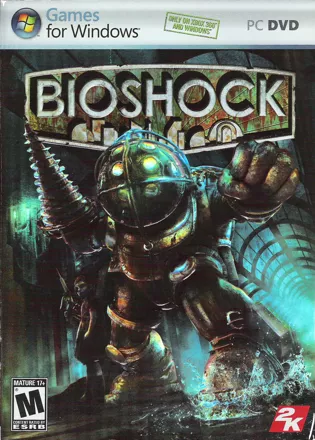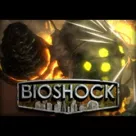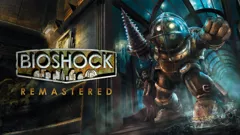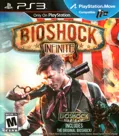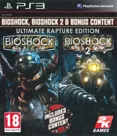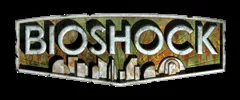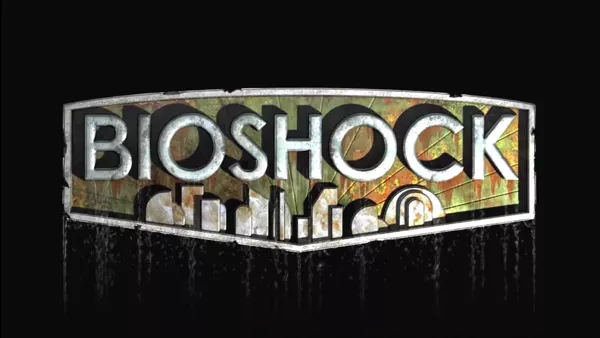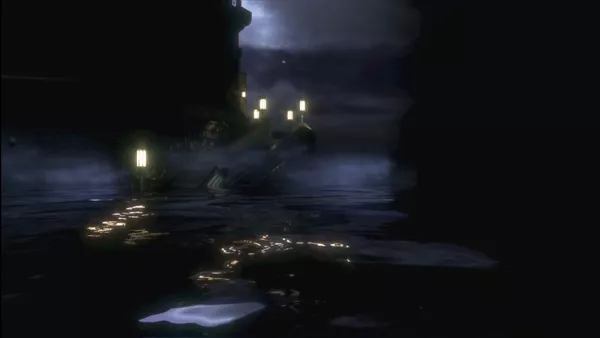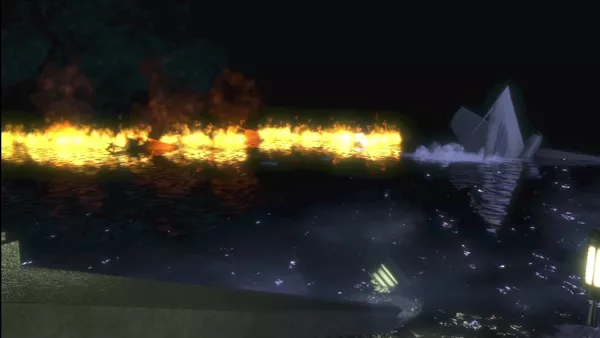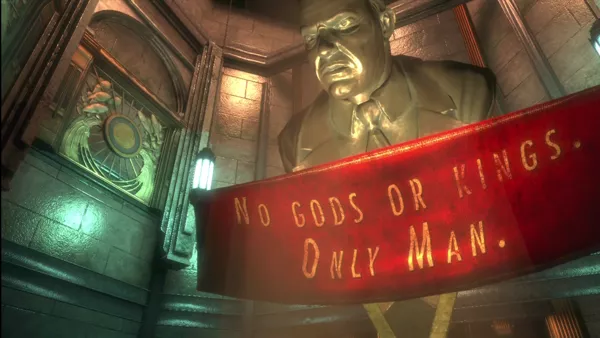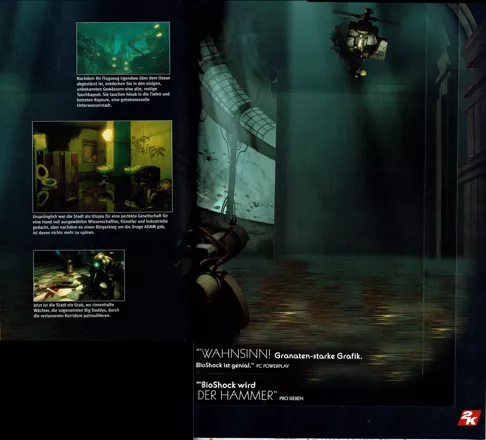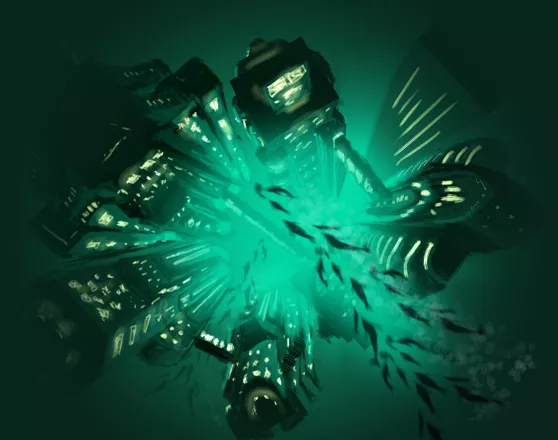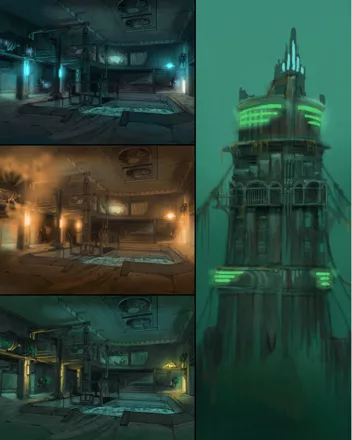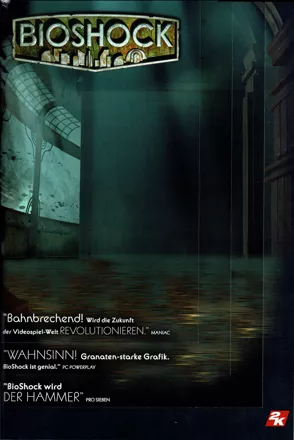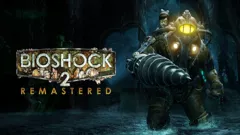BioShock
Description official descriptions
In the year 1960, a plane crashes in the middle of the Atlantic Ocean with a man named Jack as the only survivor. He has the apparent luck of resurfacing in front of what looks like a door to an underwater complex. Without hesitating, Jack enters the door and is greeted by slogans that praise the city of Rapture, a paradise of free will built in the 1940s by a business magnate named Andrew Ryan. However, even before he assimilates all this new information, the descent to this supposed paradise ends and he can only see ruins and chaos. Learning about the destiny of Rapture will be now Jack's main motivation while he tries to survive the horrors that free will can create.
BioShock is a first-person shooter with gameplay elements and storytelling technique reminiscent of System Shock games. Rapture, the once-proud social experiment inspired by the real-world objectivist philosophy of Ayn Rand, has been nearly destroyed, its inhabitants either dead or fallen victims to bizarre scientific experiments. The retro-futuristic setting incorporates elements of sci-fi with art deco and steampunk influences, featuring interior design and propaganda posters reminiscent of 1950s.
The game's plot is largely revealed through recorded messages left by Rapture's inhabitants before they were killed or mutated. Much of the plot development is therefore dedicated to reconstructing the events of the past, similarly to System Shock games. Limited usage of stealth, the possibility to hack security cameras and other devices, and character customization are the gameplay elements that further tie BioShock to its spiritual predecessors.
At its core, however, the game is more action-oriented, restricting the role-playing mechanics of System Shock 2 to abilities and upgrades that can be acquired and equipped by the main character. Most of the enemies in the game are Splicers, the deformed and insane citizens of Rapture. The protagonist has an arsenal of firearms to combat them but is also able to use plasmids, which act similarly to magic and deplete a special energy called EVE. Various types of plasmids may directly hurt enemies, sabotage their movements, or enhance the player character's defense. Combat tactics often rely on successive usage of different types of weapons and plasmids. For example, encasing an enemy in ice with a plasmid makes it possible to shatter it to pieces with a single shot; protecting himself with an electric shield, the protagonist can electrocute enemies and strike them with melee weapons, etc.
The player can only equip a limited number of active and passive plasmids, and also has an inventory limit for every type of item. Restoring and enhancing items can be found by exploring the environment or purchased from vending machines. These can also be hacked, similar to turrets, cameras, safes, and other types of locks. Hacking is presented as a Pipe Mania-like mini-game.
Plasmids, on the other hand, are mostly purchased by spending certain amounts of a mutagen known as ADAM. This mutagen can be obtained from mysterious creatures called "Little Sisters" - little girls that can be seen in most of the game's locations, accompanied and protected by very strong, genetically enhanced humans grafted to armored diving suits and nicknamed "Big Daddies". In order to capture a Little Sister the player normally has to defeat her Big Daddy. Afterward, the player has the choice of killing the girl, harvesting large amounts of ADAM in the process, or sparing her life. Depending on the player's moral decisions concerning the Little Sisters, the game's story will be concluded with different endings.
The Playstation 3 version adds a harder difficulty level called "Survivor Mode" to the game.
Groups +
- 3D Engine: Unreal Engine 3
- BioShock series
- Gameplay feature: Multiple endings
- Gameplay feature: New Game+
- Gameplay feature: Photography
- Games for Windows releases
- Games made into books
- Games with 451
- Green Pepper releases
- Middleware: Bink Video
- Physical Bonus Content: Steelbook
- Physics Engine: Havok
- PlayStation 3 Platinum Range releases
- Premium Games label
- Setting: 1960s
- Setting: Aquatic / Underwater
- Software Pyramide releases
- Sound engine: FMOD
- Technology: amBX
- Theme: Dieselpunk
- Theme: Hacking / Pseudohacking
- Xbox 360 Classics releases
- Xbox 360 Platinum Hits releases
Screenshots
Promos
Videos
Add Trailer or Gameplay Video +1 point
See any errors or missing info for this game?
You can submit a correction, contribute trivia, add to a game group, add a related site or alternate title.
Credits (Windows version)
464 People (423 developers, 41 thanks) · View all
| Story, Writing | |
| Creative Direction | |
| Director of Product Development | |
| Project Lead | |
| PC Producer | |
| Art Director | |
| Lead Animator | |
| Acting Environment Leads | |
| Performance Lead | |
| PC Specific Art | |
| Animation | |
| Concept Art | |
| Effects Artist | |
| Level Builders | |
| [ full credits ] | |
Reviews
Critics
Average score: 94% (based on 193 ratings)
Players
Average score: 4.0 out of 5 (based on 410 ratings with 17 reviews)
The Good
Bioshock is probably one of the most disturbingly beautiful games I've ever played. While the aesthetic is clearly designed to make the player uncomfortable, it's clear that the game's designers took great care to construct a believable world. The environments are believable and look lived in, water effects are above par, and the dynamic light and shadows really add to the sense of dread that makes a really good suspense/horror game possible.
The other half of making the world believable is giving it a compelling story. Rapture has no shortage of interesting characters, and the audio diaries that litter its halls add a wonderfully woven back story to an already intriguing world. Bioshock is a shining example of how to properly tell a story in a first-person shooter.
The game's controls are solid, its weapons varied, and a veritable host of power-up combinations make for an experience that never gets dull. Plasmids, or genetic enhancements, provide a new implementation of on old mechanic, namely spellcasting, but supported by an impressive customization system and a drool-worthy physics engine.
The Bad
While Bioshock leaves very little to be found wanting, it's not without its problems, minor as they may be.
While Bioshock's layout is generally good at helping the player suspend disbelief, there are times when the age-old "invisible wall" problem comes into play. Certain ledges, staircases, etc that look as if they should be accessible are instead impassible borders. The game does avoid this for the most part, but it cropped up enough that I felt it bears mentioning at least.
I also had some issues with the controller mapping, particularly certain buttons performing double duty. For example, the x button is used to hack machinery, and in many cases you need to do this quick, before a turret or security bot is reactivated. This isn't a problem, except that x ALSO is the hotkeyed button for using an EVE hypo, so if you hit it too early you can end up wasting a valuable resource. The same thing happened to me occasionally with using the b button to cancel out of menus and accidentally using health packs.
All in all though, most of my issues with the game were minimal and didn't take away at all from the overall experience.
The Bottom Line
Imagine being totally immersed in a world where everyone around you has gone horribly insane and you are the only sane person left. Not a new concept, but entirely re imagined and relocated to Rapture, the underwater utopia gone wrong.
Bioshock is chock full of truly frightening moments, and not the standard spring-loaded cat stuff, but real glimpses into chaos and insanity. There's nothing about the game that isn't entirely creepy, but at the same time appealing.
Xbox 360 · by Nick Rycar (155) · 2007
This isn’t a game review; this is a review of game reviewing
The Good
As the world crested over Y2K, nerds everywhere rejoiced in man’s greatest invention to date: the world wide web. This marked the turn of a new age, the Age of Information, where the basis of world currency turned from gold to ones and zeros. The nerd caste, once the universal butt-end of derision and wet towel snappings, found their way to the highest echelons of society and even have one of their own cast as the world’s richest man, Bill Gates. Role-playing, once a dark secret that could derail a presidential candidate, now has gone mainstream and online with a subscription rate that grows exponentially every year. That guy in high school who never spoke or left the computer room is now your boss. The nerd is triumphant.
The popular notion would be to consider the age we live in, what with its information superhighway and Ausperger’s syndrome, to be the most intelligent period of all time. People now have instant access to a wealth of information that would have taken weeks to compile. However, one instead should ask, “Does being truly smart mean you know a great deal of information?”
No. In this day and age people don’t need to know more information, instead they need to be able to process this information. Even though the mother-load of human history and knowledge is available to any and all, people choose to spend their time spouting South Park catch-phrases or quoting whatever the Insane Clown Posse has to say about their imagined enemies. The world wide web is cluttered with completely pointless web sites about ninjas and robots and ninja robots as well as the required slash fiction for said genre. Wikipedia, a brilliant idea in theory in which encyclopedia submissions are edited by its users, offers information that is on the whole unconfirmed and inaccurate. As SomethingAwful.com puts it, and puts it well, “The internet makes you stupid.”
In that case, what is so good about the internet? How can man’s greatest invention be worthy of such praise if all it can do is show you some fat kid pretending to swing a light saber around? Three things: e-mail, porn, and finding opinions that support whatever it is that you are thinking.
That’s right: the internet is not for learning. Or at any rate, nobody ever seems learns from it. If you are some dumb racist misogynist with a hate on, but can’t find anyone who sympathizes with you because they are all well-adjusted humans who don’t have an issue with their penis size, well, you’ll find all the small-penised friends you’ll ever need on the internet. If there is some opinion that proves you wrong, well, you don’t want to hear it.
And that brings us to video gamers, who are already an opinionated set of people without even mentioning “fan boys”. One common way of broadcasting one’s opinion is to write reviews; however, all these reviews posted on the internet serve to do is buttress the experience they had with the game and the justification of the game’s cost. These ordinary reviews will tell how someone feels (for example, “This game rocks!” translates better into “This great game gives me the rocking feeling!” rather than “This is a good game,”) but not any original thought beyond “Too bad you couldn’t carjack anything.” Folks, that isn’t a review: that’s an affirmation of your experience (or the opposite of affirmation if it happens to be Big Rig Racing). Video game reviews on the internet have as little to do with discussion and original thought as Britney Spears’ horrific snatch has to do with underwear when entering or leaving a motor vehicle.
The internet is littered with these testimonials that are all virtually the same: you get a synopsis of the game’s story, a run down on the graphics and sound and gameplay with scores out of ten, a consensus of “rocks” or “sucks”, a comparison to GTA San Andreas, and then the words of either “must-buy”, “rent” or “your time would be better spent masturbating”. This would be fine and all if it was a cuisinart or Astroglide or any other product you purchase, but some gamers go further and insultingly call video games “art”. Games are many things: a hobby, entertainment, a great way to tell a story and waste 100 hours of your life. But not art.
That isn’t to say there haven’t been games that have been so good that they have been “artful” or even “masterpieces”. However, gamers appear to have a limited vocabulary in reviewing games; if something is good but inexplicable falls out of the “rock” range, gamers can not comprehend and thus this becomes a critically acclaimed hit that doesn’t somehow sell many copies.
So, I was over at JazzOleg’s place, the one that has the stuffed grizzly bear that he killed himself with his own bare hands ; he had just bought his brand new computer, one that is made out of gold-pressed platinum and is faster than “Old World” immigrants at an open buffet. (it’s amazing: on top there’s an opening to which you can offer your living sacrifices to appease the angry video card god within) Like a proud poppa, he first popped in “The Witcher” and then “Bioshock”. I was so impressed with “Bioshock” that I had to get my own copy, to which I then found out doesn’t work on my YEAR-old computer. Seeing that I’m not going to get an Xbox 360 anytime soon and the ‘Corn is smart enough not to let me in his home without him, it seems I’ll never finish this game.
So this is not a review. Somebody else will gladly spout off about Ann Rand-whatsherface and quote something from wikipedia, cool. However, playing it through a short while made me think of the discussion above when I made a realization about this game.
Games are not art and gamers don’t have the ability to appreciate art in games. This is apparent in “Bioshock”, because this game succeeds in spite of itself. To be an artist in this modern age is to hide that fact that you are an artist at all.
Absolutely, “Bioshock” is a game that “rocks”, but the reason why it “rocks” is crammed far deep inside the game to save it from being a commercial failure. Daddy Systemshock whatshisface knows full well of this: you give the people only what they want; that which they need you must hide it from them or else they cannot accept. Therefore, “Bioshock” “rocks” because it has cool graphics, cool ragdoll physics, cool game play. People like the Big Daddy (well, like killing him, anyways) but may not know why. People know it’s a good story, but they don’t have to sit through verbose and pedantic exposition (the “talky” parts) before they can start killing.
The opposite of this are games that are genius, but are too good for their own good. Planescape: Torment looked like a novel because it was a novel, and disguised so poorly it flopped like a twenty-pancake belly flop. ICO is a transcendently original platform-puzzler that made a believer out of everyone who played it, but gamers instead held fast to Italian plumbers and their goombas. I’m sure the same could be said of Psychonauts, but I haven’t played it and never will because I’m waiting for the sequel, which is going to be an MMO or FPS. Whichever, it’s not that there’s any difference between the two because they both sh*t green money.
“Bioshock”, besides being a cool-ass linear FPS with a cool-ass story that you’d never ever heard of before, is masterful because it is a perfect blend of art, design and commerce. I haven’t finished it, but that much is clear from playing it for awhile and (hopefully) merits this discussion. It knows its place and being such a genius work, tricks us why we like it.
The Bad
Can't carjack any cars. Can't punch a dog into outer space. Crowds do not chant my name when I score a hat trick.
The Bottom Line
The real beauty of art is that a true masterpiece will garner our respect, especially if we don’t like it. Great art challenges us.
Meanwhile, videogames have adjustable difficulty levels.
Windows · by lasttoblame (414) · 2008
Would you kindly stop patronizing me?
The Good
BioShock polarized opinions shortly after its release, mainly because it had claimed to be something it really wasn't: a true spiritual successor to System Shock games. The game was seen by some old-timers as a herald of simplified gameplay for the masses, an unworthy stepchild conquering innocent hearts with shallow splendor. I must state that I share that sentiment; but first, as always, the good part.
BioShock is one of the most stylistically impressive games I've come across. Call it Art Deco or whatever, but in fact it is a unique "Rapturian" style. Most of the things you see in BioShock can only be seen in this game. Everything - every character, building, piece of furniture, photographs, clothes, machinery, random objects - is homogeneous, everything is designed in such a way that it suits the lush, decadent theme of the game. Rapture is instantly recognizable. Take a look at any BioShock screenshot and you'll know immediately it is from BioShock. There aren't that many games that can boast such an achievement. The game simply screams style, and from the first screen to the last you are invited to an unforgettable art gallery.
Then there are sound effects and music, truly an experience of its own. The insane babbling of the splicers, the eerie recorded voices of dead people on audio diaries, the distorted screams coming from unexpected places, the creepy child voices of little sisters, the menacing, blood-chilling humming of their protectors come on top of old music - forgotten and desolate, like Rapture itself. Very old swing tunes, the kind of jazz that feels like it should be stored in a museum - comfortable and strangely sad, vulnerable music, which turns so scary when you realize to what it serves as background. You listen to this game as much as you look at it. And if you do both, you are immersed into a strange, beautiful, disturbing world, with a magical atmosphere that draws you in with unseen force.
The contrast between the cozy "retro" world depicted in the game and the terrifying, desolate reality can be quite scary. There is something very majestic - and oddly touching - in the ruined city you'll explore. You can fall in love with Rapture. It is beautiful, yet it is also horrifying. All this marvelous work, all those visions, the ideals, the energy, the genius of its creators - everything was destroyed. Using an excellent gameplay device that did survive from System Shock, the scattered audio diaries tell you about a world and people that don't exist any more. You travel through places that were once full of life and have fell victims to destruction and decay.
The much-advertised Big Daddies and Little Sisters may not represent the epitome of choice-based gameplay, but they do add an interesting twist to the routines of the genre. Basically, we are talking about a substantial amount of tough optional bosses with a bit of a schematic "good and evil" decision pattern through in. Like everything else in the game, those characters are nicely tied into the story, and your treatment of them will eventually affect the ending.
As mentioned above, recreating the story of the past using gameplay-related means is an essential feature that was faithfully carried over from System Shock games. If you've played those you know what I'm talking about: instead of developing from cutscene to cutscene, the story is hidden in the notes left by different characters, and it's up to you to unravel it. This is retroactive storytelling, and it works great. The story itself is pretty good, though its formal structure and even a major plot twist were basically ripped out of the second System Shock 2.
The Bad
I won't go into promotional issues here, but even without all the hype similarities with System Shock games can be felt just from playing BioShock. Sadly, many of those similarities are superficial: the developers of BioShock apparently failed to understand what made its older brothers work in such splendid ways.
System Shock games were wonderfully open-ended. The space station in the first game and the abandoned ship in the second were large, generous locations you could explore at your own pace. Not so in BioShock: granted, the levels are reasonably spacious and there is optional stuff to find almost everywhere - but they are still levels. Free-form exploration was one of the chief reasons for System Shock games feeling like RPGs. BioShock doesn't feel that way at all: it's just a fairly linear shooter with some fancy magic spells.
And even as such, it's not that good. I always had a feeling that the designers wanted to make something more out of it - a deeper, more tactical game with more choices during combat. The fact is that you do have choices - but they don't mesh well with the game's mandatory fast pace and linearity. Since you cannot circumvent your enemies, the preferred alternative would be then blasting them to pieces in a fast and furious way. Instead, you'll have to micro-manage your plasmids and fiddle with your abilities just to get rid of yet another brainless splicer.
You are therefore overwhelmed by your possibilities, and that makes the game too slow, and hence overly repetitive. You'll be doing a lots of things at the same time - fighting enemies, hunting for items, buying things, etc., and most of those activities won't be new and fresh anymore. Also, those activities feel artificial and disjointed: the game conveniently pauses for you when you attempt to hack a turret - and when it's done, you are confronted once again by a flurry of chaotic enemies seemingly taken out of an arcade game. By the way, hacking is handled like a minigame, which is a poor choice per se, especially when it's easy and monotonous.
There is surprisingly little variety in enemies. It's basically the same splicers from the beginning to the end. Sure, there are several variants of them who behave quite differently, but in the end they are the same mutant humans over and over again. During later levels, the enemies become more powerful, but they still look the same and even have the same names. They just gain more health and take way too long to kill. This doesn't really contribute to the difficulty - it just increases the tedium, which is so out of place in an action game.
Resource management is a valuable game mechanic that modern games like dumbing down so much. Collecting only makes sense when the collected item is scarce and when it takes a while to complete the collection. In BioShock, you have no problem packing machine guns and grenade launchers, but you can only carry nine healing items and five hundred dollars. Ammo is too plentiful and dollars are scattered around when there is nothing I want to buy.
The ubiquitous vita chambers are, in all seriousness, a game-breaking flaw. In this game, you are essentially immortal. When you die, you always respawn with half your health intact, while your enemies are politely waiting for you to come over and finish them off. This kills any remnants of challenge and suspense the game might have still had. I clearly remember a Big Daddy fight where I literally emptied a gun into him, got killed, emptied another gun, and so on, until I emerged victorious. There was zero skill involved; I felt the designers were simply patronizing me. I cannot fathom how the designers could let such a fatal defect slip into the final version of the product.
The Bottom Line
It's not hard to see why BioShock enraged those who were craving for a true third coming of System Shock. The full truth is even sadder: Bioshock doesn't really work that well even as a simple, straightforward shooter. It is undeniably a beautiful and atmospheric game, but it is hardly fulfilling.
Windows · by Unicorn Lynx (181775) · 2016
Discussion
| Subject | By | Date |
|---|---|---|
| initial Mac releases | Cantillon (76135) | Feb 7, 2022 |
| Gameplay feature: New Game+ | Cantillon (76135) | Jun 22, 2021 |
| German PEGI (uncut) Steelbook Cover Art | Zerobrain (3052) | Oct 15, 2010 |
| Yikes. | Indra was here (20756) | May 16, 2009 |
| They're doin' it for themselves | Slug Camargo (583) | Mar 21, 2009 |
Trivia
1001 Video Games
BioShock appears in the book 1001 Video Games You Must Play Before You Die by General Editor Tony Mott.
German version
To ensure that the game wouldn't be put on the infamous list of BPjS/BPjM indexed games, 2k Games released a slightly modified version of the game and the Collector's Edition with only the German language on the disc in Germany. The changes include less blood, some changed cutscenes and no wounds on burned bodies. This version got rated "Not free for minors" by the German rating organisation USK.
Hacking
The hacking mini-game (which can be performed on a variety of devices including safes, security cameras, item dispensers, robots, etc.) is basically a slightly altered version of Pipe Dream.
Reception
According to Wall Street Journal Take Two's shares increased by nearly 20% after early favorable reviews of BioShock.
References
In Farmer's Market cantina, you can find a piece of cheese that resembles Pac-Man, even with the dots!
References to the game
BioShock was parodied in an episode of "Die Redaktion" (The Editorial Team), a monthly comedy video produced by the German gaming magazine GameStar. It was published on the DVD of issue 12/2007.
Soundtrack
On August 24, 2007 2K Games released a 12 track compilation with songs from the orchestral score composed by Garry Schyman. The compilation can be downloaded for free here: http://downloads.2kgames.com/bioshock/BioShock_Score.zip
One of the songs that were included on the Bonus EP in the Collector's Edition, was made by Moby. It's a remix of "Below the sea".
Water
2K Games had to hire a water programmer and a water artist to implement the pools and the pouring water around Rapture. This involved modifying the Unreal 3.0 engine to create realistic water effects.
Awards
- Games for Windows Magazine
- March 2008 - #4 Game of the Year 2007
- GameSpy
- 2007 – #2 Console Game of the Year
- 2007 – #2 Xbox 360 Game of the Year
- 2007 – #3 Game of the Year
- 2007 – #3 PC Game of the Year
- 2007 – Best Art Direction of the Year
- 2007 – Best Sound of the Year
- 2007 – Best Story of the Year
- 2011 – #2 Top PC Game of the 2000s
- 2012 – #2 Top PC Gaming Intro
- Mac|Life
- December 2009 - Editor's Choice Award
Information also contributed by Agent 5, Apogee IV, [bakkelun](http://www.mobygames.com/user/sheet/userSheetId,70962/), [Emepol](http://www.mobygames.com/user/sheet/userSheetId,12364/), [PCGamer77](http://www.mobygames.com/user/sheet/userSheetId,1717/), [Scott Monster](http://www.mobygames.com/user/sheet/userSheetId,35225/), [Sicarius](http://www.mobygames.com/user/sheet/userSheetId,70866/) and [WildKard](http://www.mobygames.com/user/sheet/userSheetId,16566/)
Analytics
Upgrade to MobyPro to view research rankings!
Related Sites +
-
Ain't Rapture Grand?
An Apple Games article about the Macintosh version of Bioshock, with commentary being provided by Lead Designer and Head Writer, Ken Levine (October, 2009). -
BioShock
Official game website -
Demiurge Studios
Info regarding Demiurge's involvement. -
Official Website (Mac)
The official product page for the Mac version of BioShock on the publisher's website, which provides a trailer, information about the weapons, plasmids, and tonics within the game, desktop wallpapers, a demo, and purchasing information, among other such details. -
PS3trophies.org
Trophy guide for BioShock -
Postmortem: 2K Boston/2K Australia's BioShock
on Gamasutra (2nd September 2008) -
Revoke tool
Download the tool needed to revoke one of the system activation credits. -
Something Awful review
A humorous review on Something Awful -
The Cult of Rapture
Official resource site where the full soundtrack by Garry Schyman can be downloaded, free of charge. -
UHS: Bioshock Hints
Shows hints gradually, so your game isn't spoiled. -
X360A Bioshock achievement guide
X360A's achievement guide for Bioshock.
Identifiers +
Contribute
Are you familiar with this game? Help document and preserve this entry in video game history! If your contribution is approved, you will earn points and be credited as a contributor.
Contributors to this Entry
Game added by MichaelPalin.
OnLive added by firefang9212. iPhone, PlayStation 3, iPad added by Sciere. Macintosh added by Zeppin.
Additional contributors: Sciere, Maw, Zeppin, Jason Strautman, Patrick Bregger, Starbuck the Third, FatherJack, firefang9212.
Game added August 23, 2007. Last modified March 23, 2024.
